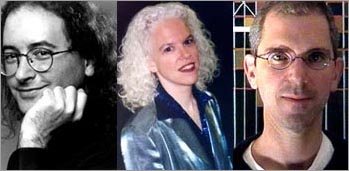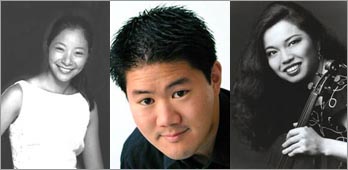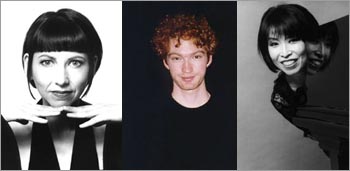Vol. XVII No. 7 April 2002 |


| Music Technology’s Second Annual
’Beyond the Machine’ The Music Technology Center (M.T.C.) presents "Beyond the Machine," its second annual two-day festival of electronic and interactive computer music, on April 3 and 4. This year the event—which was a huge success when it was launched last April—moves to the Clark Studio Theater, located in the Rose Building at 70 Lincoln Center (seventh floor). Both concerts start at 8 p.m. and admission is free.
Among the Juilliard student composers is Justine Chen (D.M.A. candidate in composition), a multi-talented composer/violinist. Her piece for five-string viola and interactive computer music system MAX/MSP will be performed by Kenji Bunch (M.M., composition/viola, 1999), and she will also present a work for recorded music and animation, in collaboration with talented digital artist Ye Won.
Samuel Solomon (M.M. candidate in percussion) presents his unique work for an African drum (djembe) and MAX/MSP, tracking and transforming the sounds of the djembe in real time, triggering sound files directly from the computer. Justine, Ray, and Sam all study in my course, Interactive Computer Music Performance, at M.T.C. An additional student composer from outside this course will be Nora Kroll-Rosenbaum (M.M. candidate in composition), whose work for piano and tape will be performed by Gloria Cheng. We are very pleased to welcome home Mr. Leon Milo (formerly known as Mr. Malloy, M.M., percussion, 1980), who became a composer after Juilliard and went on to work at Ircam in France. He will treat us to two of his works, one for piano and tape (performed by Ms. Cheng), and another for violin and tape. The striking appearance of composer/performer Martha Mooke is also highly anticipated in this year's concert. Martha crosses all boundaries of music and makes the world of electric viola her own; she will present her works using five-string electric viola and synthesizers. Other invited composers this year include Randall Woolf and John Palmer, presenting a unique sonic world of acoustic instruments combined with electronics. I will present a piece of my own for violin and MAX/MSP that focuses on the musical interaction between them. As each of these composers and performers is working in an original way at the cutting edge of his or her field, these performances promise to be eye-opening not only for the audience, but for all the musicians as well!
Our students at the Music Technology Center are using electronics and computers with ease, making them extensions of their instruments in order to express their creativity. Even for performance majors, M.T.C. is a place where a student can compose works for the first time, exploring his or her creative side. Students can try their hand at composing interactive computer music using MAX/MSP, or at creating a film score (in a class taught by Edward Bilous). It was as a violin student here that I discovered I could actually compose interactive computer music by combining the violin with the computer. I didn't see any contradiction between my classical training and composing interactive computer music. In fact, composing and using electronics opened my eyes to understanding music in a new way, and also helped me learn about musical and architectural acoustics. Thus it opened a new door, both to appreciating the classical repertoire from a fresh point of view, and hearing and understanding the violin as an instrument from an acoustical point of view. Most of all, it motivated me to examine things we take for granted, such as the interaction between players in chamber music, musicianship, and what is involved in making precise musical gestures and phrasing (since it is very hard to make computers do these things well). These days, anyone with a computer can "compose" electronic music, but some people tend to indulge themselves in the vast choices of equipment and software, rather than focusing on their artistic expression. I find my students here at Juilliard come from the opposite direction; they ask me: "I want this particular kind of musical gesture or phrase, and to create this kind of sound. What are my choices?" Although armed with gigabytes and wires, we at M.T.C. focus on works by artists who put music first—as evinced by the title of April's events, "Beyond the Machine."
Violinist/composer Mari Kimura (D.M.A., violin, 1993) teaches a graduate course in interactive computer music performance at Juilliard. Her current projects include a collaboration with composer Tania León on a work for violin and computer. She was the featured soloist at the ISCM World Music Days 2002 in Hong Kong this fall. For more information, visit http://pages.nyu.edu/~mk4/. | |||||||
| |||||||


